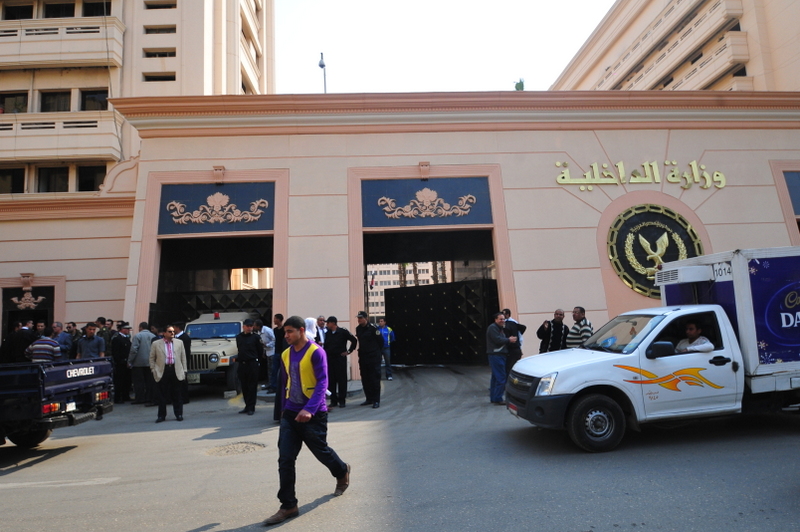CAIRO: A court decision to extend the detention of a Mansoura police officer and three other low ranking security personnel for allegedly brutalizing 33-year-old Nasr Abdallah to death has precipitated a specious calm over the village of Telbana.
“This case is especially important because it was observed by eye witnesses which is uncommon in torture and police brutality cases, Mohamed Shabana, Abdallah’s family lawyer told Daily News Egypt.
On July 31, 2007 a force from the Mansoura police station came to arrest Aly Abdullah, Nasr’s brother, for alleged drug dealing.
Aly escaped, leaving behind his wife and daughters who were, according to Shabana, beaten by the police. When Nasr and his mother arrived at Aly’s home they found the police force, led by Sergeant Mohamed Moawad, who beat both Nasr and his mother, with the help of other policemen.
“They slammed his head into the wall which was partly reinforced with metal. After that, the sergeant struck him with a wooden plank on the head, Shabana said.
Security personnel fiercely refused intervention by village elders. They also refused to allow Nasr to leave the LE 6,000 he had in his pocket with his neighbors.
After being dragged to the police truck, Nasr was shackled and beaten continuously for the whole duration of the trip to the police station, according to the testimony of one of the security personnel present at his arrest.
“When Nasr’s family sent him a lawyer who was also their neighbor to the police station, the lawyer saw Nasr who told him that he was dying, Shabana said.
After pointing his lawyer to the sergeant and force members that tortured him, Nasr went into a comma.
“They started by splashing iced water on him to wake him up, then the head investigator kicked him in the chest to make sure he wasn’t pretending to be in a coma, Shabana said.
Upon the arrival of Nasr’s older brother with two other lawyers, the authorities agreed to permit them to take him to a hospital.
Suffering from a brain aneurysm Nasr was operated upon for two hours and then died the following morning.
The preliminary coroner’s report cited skull fractures that resulted in internal bleeding of the brain, consequently hampering his cardiovascular cycle and leading to his death.
“After news of Nasr’s death spread across the village, his fellow villagers retaliated by attacking the local police office with rocks and stones, because it was the only symbol of authority upon which they could unleash their fury, Shabana said.
Security responded to the chaos ignited by Nasr’s death on Aug. 1 with tear gas and rubber bullets and arrested 13 villagers during the riots. The 13 villagers were released the following Friday out of concern that after Friday prayers, villagers may resume rioting in protest of the detentions.
“During the coffin’s procession from the village mosque, villagers refused to give or receive condolences for the death of Nasr, unless they saw the culprits punished, Shabana said.
Shabana also warns that if the case is not handled in a fair manner, he predicts that villagers will take the law into their own hands because they feel that the police deviated from its role as a protector of peace.
“Part of the reason the security personnel were so aggressive with Nasr is because they knew that he was not a Telbana native, and assumed that he did not have the family network that could protect him from their actions, Shabana explained.
Nasr, who was a carpenter, came from a family that emigrated to Telbana from Upper Egypt in 1952.
In Wednesday’s court session, Sergeant Mohamed Moawad and fellow force members exchanged accusations regarding who was actually responsible for the beating of Nasr.
Moawad also claimed that the original search warrant was issued for Nasr himself and not his brother Aly, a claim a number of witnesses that included members of the force he was leading, have denied.
The second suspect, Ahmed Abdel Azim, an investigator involved in Nasr’s arrest, also said that an agreement had been reached between the station’s commissioner and Moawad that the low ranking force members would be the ones held responsible and Moawad would not be held accountable.
A 70-person demonstration organized by the Kefaya Egyptian Movement for Change stood in solidarity with local villagers during the Wednesday hearing, with signs condemning torture in Egyptian police stations.
“If we do not get our rights from Egyptian courts we will go to international ones, Kefaya is spearheading a campaign against torture in Egypt, George Ishaq, former Kefaya coordinator and founding member, told Daily News Egypt.


